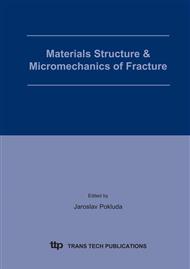p.355
p.359
p.363
p.367
p.371
p.375
p.379
p.383
p.387
Influence of Isothermal Transformation Dwell on Tensile and Fatigue Properties of Austempered Ductile Iron
Abstract:
Two ADI heats transformed at temperatures of 400 and 380 °C during temporal range from 2 minutes to 9 hours were studied in details, with emphasis on structure composition and mechanical properties (tensile and fatigue properties were determined). In the case of the shortest dwells the level of mechanical properties is influenced by martensite, which occurs in the structure as a result of subsequent cooling. UTS and yield stress increase slightly with the dwell of isothermal transformation while the values of elongation to fracture as well as of fatigue limit are very closely dependent on the amount of the retained austenite in the microstructure.
Info:
Periodical:
Pages:
371-374
DOI:
Citation:
Online since:
April 2005
Authors:
Price:
Сopyright:
© 2005 Trans Tech Publications Ltd. All Rights Reserved
Share:
Citation:


